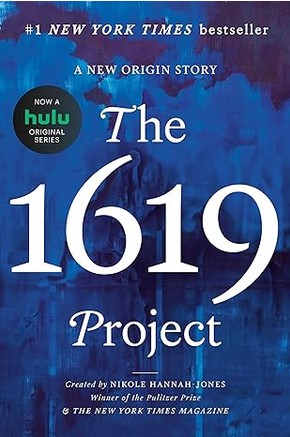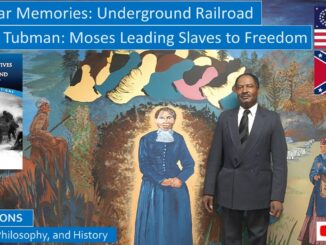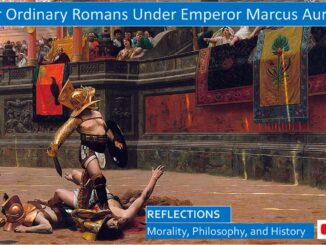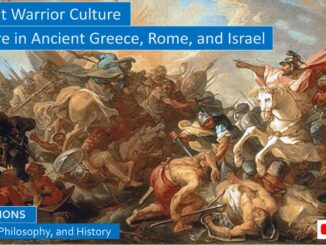
Both concerned parents and activists who have no children have been flooding school board meetings across the country yelling and threatening each other over critical race theory and whether we should be teaching our children American History starting with our Founding Fathers and the American Revolution when we won our liberty from the British in 1776, or should we teach our children that our country was originally built on the unpaid labor and bones of slaves since the first was shipped over in 1619 with the first colonists? What role did slavery play in the founding of our nation, and when did slavery end? Finally, when discussing what books should be included in young students’ lessons, one book has stirred considerable controversy, Beloved, by Tomi Morrison.
This is a continuation of another video and blog on suggestions on how teachers can teach both sides of critical race theory:
Critical Race Theory: Reviewing the 1619 Project and Beloved
http://www.seekingvirtueandwisdom.com/critical-race-theory-reviewing-the-1619-project-and-beloved/
https://youtu.be/JRdnB0lqN5o
See our YouTube video: https://youtu.be/JRdnB0lqN5o
Youtube script for more book links: https://www.slideshare.net/BruceStrom1/critical-race-theory-reviewing-the-books-the-1619-project-and-beloved
SUMMARY OF AMERICAN CIVIL RIGHTS HISTORY
How did slavery start in 1619? With pirates, and pirates play a big part in the history of slavery back to ancient times, pirates often raided coastal areas to enslave their victims. These pirates stole several dozen slaves from a slaver ship and resold them to the colonists in Jamestown.[1]
There is another critical decade in American History, and that is the 1830’s when the Abolitionist movement first started agitating for the abolition of slavery. This movement started in England when a former slave-trader, Wilbur Wilberforce, who penned Amazing Grace, fought for the abolition of the slave trade in England, a battle that led England to abolish the international slave trade.
This is a broad-brush summary of American Civil Rights History:
- 1619 – 1776: Colonization: Indentured servants replaced by slaves on large Southern plantations.
- 1787: Compromises of Constitutional Convention: International slave trade abolished in 1808, slaves 3/5’s of a person, fugitive slave laws, Founding Fathers thought slavery would soon wither away.
- 1793: Eli Whitney invented the cotton gin, this helped rejuvenate the slave economy.
- 1830’s: Abolitionists agitate for end of slavery in England/US.
- 1850’s: Free Labor movement sought to abolish the unfair competition between free white yeomen and slaves in the territories.
- 1861-1865: Black runaway slaves were a key factor in the Northern victory in the Civil War.
- 1865-1877: Presidential and Radical Reconstruction.
- 1877-1960’s: Redemptionist or Jim Crow era of discrimination.
- 1900’s: Invention of mechanical harvesters, less need for slave labor.
- 1965: Passage of Civil Rights Act, Second Civil Rights Movement.
REVIEWING BELOVED, BY TONI MORRISON
During our discussion group I pointed out my opinion that Beloved would likely turn off old white Christian men like me, that it was not helpful, and the black ladies in the group mentioned that Toni Morrison was mainly speaking to other black women, helping them deal with the psychological struggles in understanding their past and coping with trying to thrive and survive in a country where many whites were not sympathetic with the Black Lives Matter movement, and again notice, this is much more a movement than an organization, and BLM is not synonymous with communism, that assertion is slanderous and is a bald-faced lie.
Toni Morrison was born in 1931, the math states that in her twenties she lived in the Jim Crow era, a dark time for blacks to live, her negative personal experiences living under Jim Crow affected the message she would tell.
Now let us read the opening sentences of Beloved:
Keep in mind, the intended audience is other black women struggling to come to terms with both past and present:
“124 was spiteful. Full of a baby’s venom. The women in the hour knew it and so did the children. For years each put up with the spite in his own way, but by 1873 Sethe and her daughter Denver were its only victims. The grandmother, Baby Suggs, was dead, and the sons, Howards and Buglar, had run away by the time they were thirteen years old – as soon as merely looking in a mirror shattered it (that was the signal for Buglar); as soon as two tiny handprints appeared in the cake (that was it for Howard). Neither boy waited to see more; another kettleful of chickpeas smoking in a heap on the floor; soda crackers crumbled and strewn in a line next to the doorway.”[2]
These traumatic ramblings go on for much of the book. After the first chapter I was able to pick up on some clues on what was happening, but after a few dozen pages, I was forced to ask Dr Wikipedia for a synopsis.
IMHO, books should really be written so you can read them without asking for help from Dr Wikipedia or an English teacher looking over your shoulder telling you what you should think about the book. Beloved is a book for woke English teachers. WOKE is here defined as any English teacher who forces her students to read Lord of the Flies every year, so she doesn’t have to read any new books herself.
And Dr Wikipedia also says there are other people who do not like this book. The other books in this trilogy read much the same way, says Dr Wikipedia.
So we will allow Dr Wikipedia to summarize the plot:
“Beloved is inspired by an event that actually happened: a slave escaped and fled to the free state of Ohio in 1856. She was subject to capture in accordance with the Fugitive Slave Act of 1850; when U.S. marshals burst into the cabin where Garner and her husband had barricaded themselves, she was attempting to kill her children, and had already killed her two-year-old daughter, to spare them from being returned to slavery.”
These traumatic ramblings go on for much of the book. After the first chapter I was able to pick up on some clues on what was happening, but after a few dozen pages, I was forced to ask Dr Wikipedia for a synopsis.
IMHO, books should really be written so you can read them without asking for help from Dr Wikipedia or an English teachers looking over your shoulder telling you what you should think about the book. Beloved is a book for woke English teachers. WOKE is here defined as any English teacher who forces her students to read Lord of the Flies every year so she doesn’t have to read any new books herself.
And Dr Wikipedia also says there are other people who do not like this book. The other books in this trilogy read much the same way, says Dr Wikipedia.
So we will allow Dr Wikipedia to summarize the plot:
“Beloved is inspired by an event that actually happened: a slave escaped and fled to the free state of Ohio in 1856. She was subject to capture in accordance with the Fugitive Slave Act of 1850; when U.S. marshals burst into the cabin where Garner and her husband had barricaded themselves, she was attempting to kill her children, and had already killed her two-year-old daughter, to spare them from being returned to slavery.”[3]
Now we know the reason for these traumatic ramblings, her life experiences are so devastating that this ex-slave mother exists in a state of perpetual mental breakdown, like she is psychotic.
By the way, there is precedent for this action. Soon after the time of Christ the Jews revolted against the Romans, their last redoubt was the fortress Herod built in the desert, Masada. The Romans built massive siegeworks that exist up to the present day to storm the citadel, it was common practice in the ancient world, when you captured a hostile enemy city, to massacre the men and enslave the women and children, and they could select concubines from among the women and girls. To save their family from slavery under pagan masters, the Jewish defenders at Masada first slew their women and children, then the men all committed suicide.[4]
We continue with Dr Wikipedia’s plot summary: “Beloved begins in 1873 with Sethe, a formerly enslaved woman, and her 18-year-old daughter Denver, who live at 124 Bluestone Road. The site has been haunted for years by what they believe is the ghost of Sethe’s eldest daughter. Sethe’s sons, Howard and Buglar, ran away from home by the age of 13, due to the ghost.
One day, Paul D, one of the enslaved men from Sweet Home, the plantation where Sethe, Halle, Baby Suggs, and several others were once enslaved, arrives at Sethe’s home. He forces out the spirit, and persuades them to leave the house together for the first time in years for a carnival. Upon returning home, they find a young woman sitting in front of the house who calls herself Beloved. Beloved appears to be a ghost of the baby who was killed.”[5]
Another personal criticism of Beloved is that it actually understates the brutality of slavery.
Beloved is also an extreme example of the Kramer problem. If you remember, Kramer lived in the same apartment as Jerry Seinfeld, and Kramer never worked, evidently was not living off an inheritance, and his only life skill was his dramatic entrances into Jerry’s apartment, like how could he afford to pay the rent on a New York City apartment?
After the Civil War, our ex-slave mother Sethe and her large family lived in this apparently large house in Ohio, she doesn’t have a job, how did she make rent? She somehow is living in this same haunted house, she is too traumatized to make rent, but her family is left alone, how can that be?
Reality would be even more cruel than the book. Her baby was not her baby, her baby belonged to her master, her baby was her master’s property, and when she killed her baby, she was destroying her master’s property. When she was returned to her master, she would have been severely beaten, probably beaten to death. In general, when people are down, they are not left alone, they are continuously hounded until they are utterly and completely ruined.
Dr Wikipedia continues his plot summary:
“Paul D begins to feel increasingly uncomfortable in the house and that he is being driven out. One night, Paul D is cornered by Beloved, who demands sex. While they have sex, his mind is filled with horrific memories from his past. Paul D tries to tell Sethe about it, but cannot. Instead, he says that he wants her pregnant,” etc.
Now I totally get why the sex is so casual, slavery robbed women of their agency, their privacy, their free will, if the master wanted to force himself on his slave, she was his property, he could do with her as he wished.
I would like to point out that sexual assault and concubines is a problem in all systems of slavery in both the ancient and modern worlds, and we have a video that explores this concept, how the Iliad itself was about the trading of concubines between men where the women could never just say NO, and how the Old Testament laws exhorted the Jewish soldiers to treat their concubines with kindness, as they are truly their Jewish wives.
We discussed this in our video and blog:
Iliad Blog 2, Captured Concubines in the Iliad and the Torah
http://www.seekingvirtueandwisdom.com/iliad_blog02/
Concubines in the Iliad, Old Testament and Christian Tradition
https://youtu.be/bGHHD7XTvr0
The author is expressing how the morals of slaves who are treated like breeding livestock can be debased, but many white Christians trying to read this book who are not black, who are not in tune with the ugly history of slavery, they are just going to be offended by the casual sex, and this detracts from the main message.
Finally, we have the odd plot line of casting this as a ghost story, where the soul of the murdered infant slave girl is resurrected in a mysterious character in the book. This is also not a Christian theme, and also detracts from the main message.
Beloved is a despairing novel, though the characters in the story do reconcile themselves somewhat to their fate. Much more inspiring are the slave biographies we have reviewed, and you may object that these are the small minority of ex-slaves who were able to rise above their condition. Beloved, in contrast, is about the bottom tenth of slaves who were eternally traumatized by the years they spent in slavery. However, inspiring stories inspire all of us to improve our lives, but despairing stories are just plain depressing.
Should Beloved be banned from school libraries? Absolutely not, children watch movies that are worse than this, and if you ban this book, the right wing-nuts will want to ban every other book that conflicts with the Lost Cause narrative.
Another work that we think is more useful in conveying the horrors of slavery is the slave autobiography of Frederick Douglass, the escaped slave who became a leading abolitionist and orator in the Civil War and Reconstruction eras:
Frederick Douglass Tells Us About His Life as a Slave in his Autobiography
http://www.seekingvirtueandwisdom.com/frederick-douglass-tells-us-about-his-life-as-a-slave-in-his-autobiography/
https://youtu.be/7VkzhyNnuQk
REVIEWING THE BOOKTHE 1619 PROJECT
We will review a chapter with some remarkable stories about the persecutions and assassinations of ordinary blacks who tried to be successful, too uppity, in the Deep South not so long ago, in the post-World War II era of prosperity. The next time you accuse blacks of being shiftless, lazy, or unenterprising, these stories should give you pause, as they reveal what happened to blacks who were too successful in the Deep South.
This is a story of Elmore Bolling in Lowndesboro, Alabama. Elmore had a large family, seven children who helped in the family business, “a large house, a general store, a delivery service, a catering company, and a gas station.” “At his peak, Elmore employed as many as forty people, all black like him.” He likely had forty thousand in savings, his total assets in today’s dollars may have been half a million dollars, all money that he earned.
Elmore only rented his property, he never owned it. His father and grandfather had owned a farm on which they ran cattle. After they became successful, a white neighbor claimed the land was his, and just stole it from them, for blacks had no access to the legal system whatsoever in the state of Alabama.
“But it was the expansion of his little general store that changed his fortunes. Elmore and Bertha Mae started doing Friday night fish fries, serving Sunday dinners, and selling ice-cream to the after-church crowd, a delicacy where most folks didn’t have electricity.” “They grew their business by adding a one-pump gas station out front. Elmore got the idea to sell gas after a white-owned station nearby refused to serve him. At the Bolling’s pump, black drivers would have a safe, reliable place to fill up.”
“Not long after, the Bollings and every black man, woman, and child in the county would learn the cost of daring to be too successful, too free. On a mild December day in 1947 a deputy sheriff came to Elmore’s store while his twelve-year son, Willie D, was working and asked where his father was.” His father was running errands, and when he returned some cars were following him.
“As Elmore got out of his truck, two white men confronted him. It seemed that in buying a pump and selling gas, Elmore had stepped over some invisible line. Gun fire rang out. The white men shot Elmore seven times. His wife and three of his children heard the terrifying sounds and rushed from the store to find him lying dead in a ditch.”
Why would these white men be so brazen that they would murder a black man in broad daylight making no effort to conceal their identities in front of his wife and children? The deputy sheriff was involved, there was no justice for blacks in Jim Crow Alabama. When blacks called in crimes committed to them, often they, the victim, were arrested, for causing trouble. Plus, in the Deep South during slavery, blacks were seen as subhuman, like talking livestock. You would think nothing of butchering a cow in sight of its calf, many white people would reason, why would this matter for blacks?
This is not a unique story. The first lynching documented by the incredibly brave black journalist, Ida B Wells, was a lynching of a black storeowner who dared to compete with a white storeowner. The accusation was that he molested some white woman, that was usually the accusation, when there was an accusation, but success in competing against white people was the reason why he was seen as being way too uppity.
Unlike the blacks in Beloved, now the whites persecuted the members of the black family even more intensely after the murder of Elmore. The youngest daughter Josephine remembers, “Within a year of Elmore Bolling’s murder, nearly all of the family’s wealth was gone. White creditors and whites posing as creditors took the money the family made from the sale of their trucks and cattle. Other whites simply claimed they were owed money. Bertha Mae feared what would happen if she didn’t pay them.” The family lost everything. They lost their inheritance. They lost their home; they were later forced to flee the county in the dark of night to save their lives.
The youngest daughter Josephine remembers, “My father’s murder actually killed aspirations for black people. Everyone had to go back working for plantation owners. No one wanted to take over the business.” Not his brothers, one brother said of the business, “No, that is what got Elmore killed.”
Young Josephine was the least traumatized because she was so young, she was the only child who attended college, and she became a teacher, one of the few safe occupations open to blacks in those days. Even though Elmore had encouraged all of his children to get an education, all the other children eventually dropped out of school, taking safe, unsuccessful menial jobs to eke out a living. Josephine tells the sad tale of how this Second Amendment afternoon ruined the lives of several generations by telling the sad tale of woes faced by many black families: money problems, marital problems, drinking problems, mental problems which landed Willie D, the son who helped his father and watched him die in the ditch, in a psychiatric facility.
The suppressed memories Willie D locked up in his soul bubbled up when talking to his sister Josephine one day. “The white men who came to the store looking for his father. The terror he felt. The sounds of gunfire. His father’s dead body. He had even tried to peel the boots off his father’s feet because he would not be able to get to heaven with his boots on.”
There is an even worse story about a prosperous black farmer was “was getting too damned prosperous and biggity for a nigger.”
This is the story of how the problem of black prosperity was dealt with. A black man had the temerity to become a successful farmer on a 140 acre farm. “Days later, when the black man and four of his children went into town, a marshal served him a warrant for trespassing. The marshal then attacked the black man, pistol-whipping him to the ground. A group of white men jumped in and began to choke and beat him. As his daughters rushed to help their father, a man kicked one of them in the gut. The family was overpowered by the mob and dragged to jail. Three of the man’s daughters were charged with resisting arrest, and his son was falsely accused of carrying a pistol.”
The mob that night shot up his house, waking his wife and other children. In the next few days their stolen crops were sold underneath them. The family fled. “They never returned, they had been warned if they returned, they would be lynched. The father was sentenced to twelve months on a chain gang and fined $250. The daughters were fined $50 each, the son was fined $100.”[6]
[1] https://www.history.com/this-day-in-history/first-african-slave-ship-arrives-jamestown-colony
Toni Morrison, Beloved (New York, Vintage Books, 1987, 2004), p. 3.
[3] https://en.wikipedia.org/wiki/Beloved_(novel)
[4] https://en.wikipedia.org/wiki/Masada
[5] https://en.wikipedia.org/wiki/Beloved_(novel)
[6] Trymaine Lee, Chapter on Inheritance, The 1619 Project, created by Nikole Hannah-Jones (New York: One World, 2021), pp. 294-305.





1 Trackback / Pingback